This is something I wrote a long time back. I don't know why but I feel like putting it up today
Walking Paradox
Location: G-86, H-9
Sudha Rajgadia, Final year, B.Pharm says:
Sometimes, without quite intending to do so, I imagine myself as a house with a million swarming inhabitants. It seems everything in the house is working perfectly well- the mothers know exactly when to cook and how to, and where the dirty laundry goes and when it would be a decent time to clean up. The children know when to feed and the Fathers, when to make a buzz for the office, when to grab a cappuccino, tall, latte, Grande. The bachelors play cards on Sundays, then wake up Monday morning to make themselves omelet, just so. Everything’s going great. Life goes on. Then one fine day, all the moms decide they’re tired of their chores and just laze about all day. The kids are wailing, the husbands are freaked and go play cards with the bachelor guys all day. The kids wail even worse. And the funny thing is the house is incapable of knowing all this. As in, as far as the internal workings of my body are concerned, I’m about as passive an observer as that house.
The human conscious is aware of itself, of the world, of language, of black holes, mesons, dinosaurs and cells. Yet, the workings of our own body as we live, and move on each day, are beyond the grasp of our conscious. To find out about your ailing heart, which is very much a part of you, you need a host of paramedics and specialists, to know for sure. To find the cure for an illness, we must know how it attacks our system, the pathways, the way various intricate mechanisms swing into place over the course of its advancement. Even if we ourselves are afflicted, we just don’t know, (as we know intuitively that we are sad or that the rose is red) that our various little antibodies and antigens are doing this right now and so and so is happening to them. We are incapable of this kind of awareness. Even if it is genetic, inherited over generations, we still don’t inherit along with the illness, an awareness that we may be afflicted. Maybe, all for the better, maybe not. We need two millennia worth of civilization, a century’s worth of research in the Biological Sciences….and more, to attain this tiny fragment of knowledge about our own genetic constitution. At times it feels like the self is playing a game with the conscious, all the while knowing that it has the upper hand. If we are a truly conscious being, I dare to ask, HOW is it that we have an absolute lack of awareness of the way we tick? If our conscious lacks this awareness, then, are we anything more than a bag of chemical reactions with fancy gadgets attached? Rephrasing, are we truly conscious as we believe ourselves to be? Or is it like everything else, Maya, a projection?
Friendly Feminist Fun
Location: Coffee Shop
Udita Sanga, Final year, Biotechnology
I really don’t like the way Ayn Rand develops her female characters. They are born pillars of strength, focused, determined and of the most profound principles. As the story develops they wither away submitting to the nearest male character, as in Dominique, or multiple male characters as in Dagny Taggart. Somehow the Randian ideal woman needs the support of a man or considers fulfillment in the light of submission of her will to that of the ideal man. When you think that Ayn Rand was a woman herself, this puzzles you all the more. The mind behind the Objectivist school, the founder of the ARI, an institution that has spread its influence throughout the world, found the need to submit her women creations to men. Which is quite frankly medieval. Even Margaret Mitchell could conceive an independent Scarlett who doesn’t need a Rhett Butler in the dusty red soils of Tara. Coming to think of it, the characters of Mammy and many other supporting female characters too, had spirit, to the end. Virginia Woolfe showed women in traditional roles, house-wives and seamstresses, who emerge triumphant as figures of steel and concrete, souls that provide refuge and courage for many male characters, ideal and not so ideal. Mrs. Dalloway, mid 20th century house-wife, best hostess in London, peels like an onion as the story develops, revealing layers, asserting herself, manipulating circumstances, never pretending to be intellectual and at the same time much more lucid and intense than the so-called “intellectuals” in the story. Bearing in mind the tradition of Jane Eyre and Scarlett, the woman in an Ayn Rand work is a mere shadow, a poor imitation of the ideal. When it boils down to the basics, where does Ayn Rand, foremost Objectivist thinker of the 20th century stand in relation to her own tribe?
How would you like to go to the moon?
Location- H-9 Lawn
Sonia Joseph, Final Year Biotechnology
There are times like this, midsummer, when the grass is wet with dew, yet not damp. The sky is almost black, yet not quite and the clouds have a silver underbelly. And then you lay yourself on the grass and look up. What strikes you first is the moon, and I hope, for your sake, that it’s a full moon.
This reminds me, whenever I see a full moon, I remember this Malayalam song that my dad used to sing. The lyrics were very beautiful. Something on the lines of “the full moon emerged from her bath, drying herself on a towel of fog” and then the guy goes on to say something about how all these women were there at this place, (some fair or something-ancient version of piya milan chowk)except his lover. And then he keeps waiting, and I guess she never turns up. No, the song was never dedicated to my Mother. My Dad is my Dad. Cruel little mind games are his thing.
Anyway getting back to the point, there are times when you just imagine you are going on a trip to the moon. Some people choose to go by car, sports, sedan, anything. These are normally the busy to get there people. Of course, there are ultimate no-dreamers, the “practical person”, who goes like “obviously space shuttle, people!” They deserve to be hanged. A friend of mine wanted to ride a Harley, the ultimate roadie experience, vrooming through inter-planetary space.
I, I thought of riding a cycle and still a moment later thought it would be nice to just walk. Maybe you could gather a handful of star dust, stop and watch a comet whizz by, where was the hurry?
There were three of us, lying on the grass, getting ready to go to the moon. We looked fairly comical, our legs in the air, one of us turning the steering, another revving the handle and a third swinging her arms and legs in exaggerated leisure. The moment defined for each of us at least a part of who we were. And I figured, hey whatever, I don’t want to miss a thing.
Subscribe to:
Post Comments (Atom)




.jpg)
.jpg)
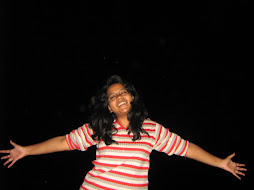

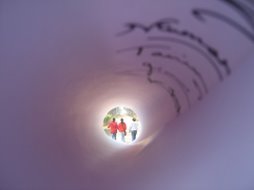
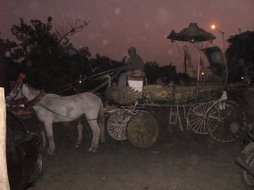
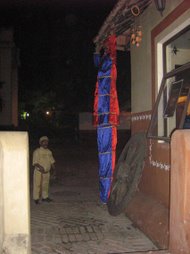
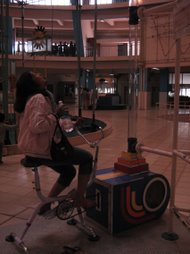
1 comment:
Really loved this one!Brought back good memories.Specially liked the way you put sudha's thoughts.The chase to the moon made me smile...
Post a Comment